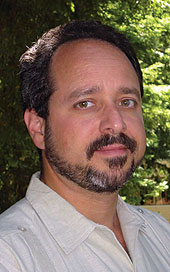September 11, 2006
Mexican migrants ‘invisible no more,’ says report coauthored by LALS prof
By
Jennifer McNulty
Earlier this year, unprecedented numbers of Mexican immigrants took to the streets of major U.S. cities to demand comprehensive immigration reform.

Jonathan Fox
Photo: Jennifer McNulty |
The demonstrations, a direct response to policy changes proposed by the Bush administration, marked a new level of civic engagement for millions of Mexicans living in the United States.
Mexican migrants have become important political and civic actors, according to the new report “Invisible No More: Mexican Migrant Civic Participation in the United States,” published by the Woodrow Wilson International Center for Scholars and the Department of Latin American and Latino Studies (LALS) at UCSC.
More than 11 million people in the United States were born in Mexico--more than 3 percent of the U.S. population and 9 percent of Mexico's total population, according to the report’s coauthor Jonathan Fox, a professor of LALS.
A growing force, Mexican migrants are increasingly participating
in existing U.S. civic organizations and have created hundreds
of new migrant-led organizations as well. The report analyzes
the consolidation of migrant-led organizations and their relationships
with traditional Latino organizations, the role of Spanish-language
media in migrant communities, and naturalization and voting
patterns among those born in Mexico.
Although the spring protests, dominated by Mexican migrants, marked a new level of activism and visibility, the authors maintain that the activity was also the culmination of a process that has been evolving for years.
“The scale and spread of the protests caught almost everyone by surprise,” said Fox. “It was the first time Mexican migrants, who were the majority of participants in many of the cities, took such a visible role in a national policy discussion.”
The decision by hundreds of thousands of immigrant workers, housewives, students, and farmworkers to march in the streets in pursuit of the right to full membership in U.S. society suggests “a major turning point,” he said.
Migrants have created their own organizations and joined--and transformed, as have previous generations of immigrants throughout American history--existing groups, such as community associations, churches, schools, unions, business associations, civil rights organizations, and media groups.
Released Aug. 17, the report has received coverage in major media outlets, including the Associated Press and the Spanish-language media; and several Christian publications have picked up on the report’s analysis of how Mexican immigrants have become an integral part of many churches.
The report is the result of a two-day conference held in 2005 during which migrant and civic leaders and researchers from around the United States and Mexico gathered to discuss the role of Mexican migrants in civic and political life in the United States.
The report is available at www.wilsoncenter.org/mexico.
Established in Washington, D.C., in 1968, the Wilson Center is a nonpartisan institution that provides a forum for free, open, and informed dialogue about national and world affairs. The center's Mexico Institute, launched in 2003, seeks to improve understanding, communication, and cooperation between Mexico and the United States by promoting research, public discussion, and publications on issues of mutual concern.